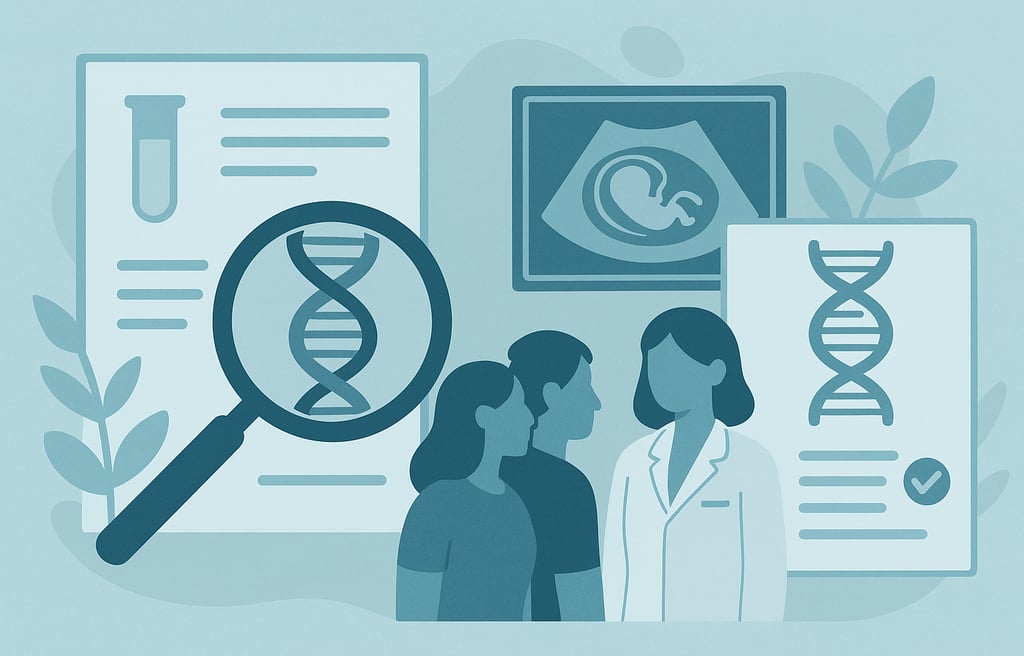Genetic Testing Before IVF: What You Need to Know
Thinking about IVF? Learn how genetic testing and carrier screening can shape your fertility journey and help guide treatment planning.
DIAGNOSIS & TESTING
7/4/20252 min read


When starting IVF, you might expect hormone tests and scans — but what about your DNA? Genetic testing before IVF is increasingly recommended as part of fertility workups, helping identify inherited conditions and informing personalised treatment plans.
In this post, we’ll explain what genetic testing before IVF involves, who should consider it, and how it might impact your path to parenthood.
What Is Genetic Testing Before IVF?
Genetic testing before IVF typically includes:
Carrier screening: A blood or saliva test that checks if you or your partner carry gene mutations linked to inherited conditions (like cystic fibrosis or Tay-Sachs). You might be healthy but still carry a mutation that could affect your child.
Karyotyping: A chromosome analysis that can detect structural issues (such as balanced translocations) that may lead to miscarriage or implantation failure.
Genetic counselling: Often offered alongside testing, this helps interpret results and decide on next steps.
Why Is It Done?
Genetic testing helps reduce the risk of passing on serious inherited diseases and can also:
Help explain recurrent miscarriages or failed IVF cycles.
Flag conditions that might affect egg, sperm, or embryo quality.
Inform whether PGT (preimplantation genetic testing) may be needed during IVF.
Who Should Consider Genetic Testing Before IVF?
While testing is optional, it’s often recommended if:
You or your partner have a family history of genetic conditions.
You’re from an ethnic background with higher prevalence of specific diseases (e.g., Ashkenazi Jewish, South Asian, African, Mediterranean).
You’ve experienced multiple miscarriages or failed fertility treatments.
You’re using donor sperm or eggs (testing helps match with a non-carrier).
You’re simply curious and want to be prepared.
Some clinics now offer universal expanded carrier screening to all IVF patients, regardless of history.
What Happens If You're a Carrier?
If one of you is a carrier and the other isn’t, your child will likely be unaffected — but both parents carrying the same gene mutation raises the risk of an inherited condition.
In those cases, your clinic may recommend:
Preimplantation Genetic Testing for Monogenic diseases (PGT-M) during IVF to select unaffected embryos.
Genetic counselling to explore options, including donor gametes or adoption.
Does the NHS Offer Genetic Testing Before IVF?
Carrier screening is not routinely offered on the NHS unless there’s a known family history. Private clinics, however, often include expanded panels — testing for over 400 conditions — as part of their IVF package.
How Much Does Genetic Testing Cost in the UK?
Carrier screening (private): ~£300–£700 per person, depending on panel size. Partner testing is usually only needed if you're found to be a carrier.
Karyotype testing: ~£350–£600.
PGT during IVF: ~£3,000–£5,000 extra, depending on the type of test and number of embryos screened.
Is It Worth It?
This is a deeply personal decision. Some couples find comfort in ruling out major risks, while others prefer not to test unless there’s a clear reason. If you’re unsure, talking to a genetic counsellor can help clarify your values and concerns.
Genetic testing before IVF isn't always required — but for some, it’s a powerful tool to avoid heartache and plan ahead. If you’re just starting your fertility journey, ask your clinic what testing is available, and whether it’s recommended in your case. It’s one more way to take control, gather information, and build your family with confidence.
© 2025. All rights reserved.
